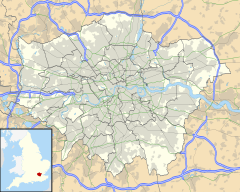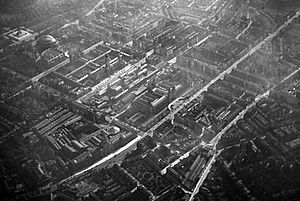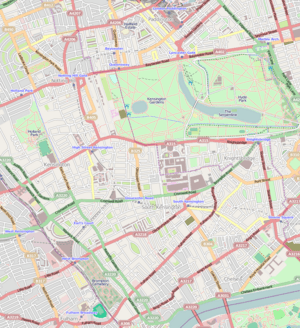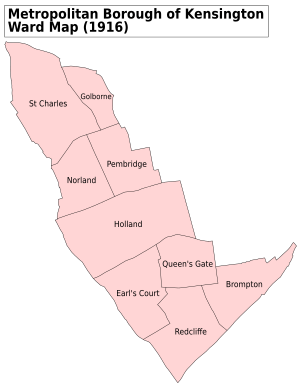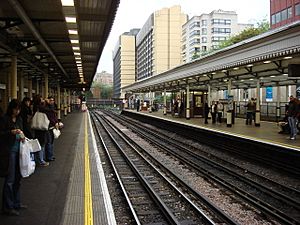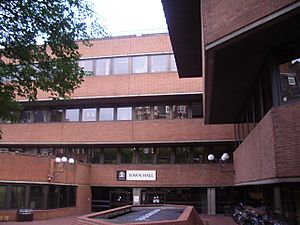Kensington facts for kids
Quick facts for kids Kensington |
|
|---|---|
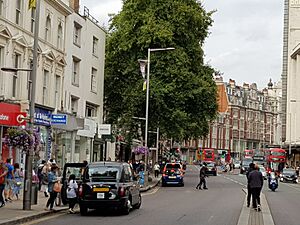 Kensington High Street |
|
| Population | 64,681 (2011 census) |
| OS grid reference | TQ255795 |
| London borough | |
| Ceremonial county | Greater London |
| Region | |
| Country | England |
| Sovereign state | United Kingdom |
| Post town | LONDON |
| Postcode district | W8, W14 |
| Dialling code | 020 |
| Police | Metropolitan |
| Fire | London |
| Ambulance | London |
| EU Parliament | London |
| UK Parliament | |
| London Assembly | |
Kensington is a well-known area in London, England. It's part of the Royal Borough of Kensington and Chelsea, located about 4.6 kilometers (2.9 miles) west of Central London.
The main shopping area in Kensington is Kensington High Street. It runs from east to west and has many shops. To the northeast, you'll find Kensington Gardens. This large park is home to the Albert Memorial, the Serpentine Gallery, and a monument to John Hanning Speke.
South Kensington and Gloucester Road are important areas. They have several famous places like Imperial College London, the Royal College of Music, the Royal Albert Hall, the Natural History Museum, the Victoria and Albert Museum, and the Science Museum. Many countries also have their embassies and consulates in Kensington.
Contents
What's in a Name?
The name Kensington comes from a very old word. In the Domesday Book of 1086, it was called Chenesitone. This Anglo-Saxon name means "Chenesi's ton", which means "Chenesi's homestead" or "settlement". An older spelling from 1396 was Kesyngton.
A Look Back in Time
After the Norman conquest of England in 1066, King William the Conqueror gave many areas of land to his trusted friends. The area of Kensington was given to Geoffrey de Montbray, a powerful bishop. He then let his follower, Aubrey de Vere I, live there and manage the land.
Later, Aubrey de Vere I became a direct tenant of the king, which made him even more important. His family, the de Veres, became Earls of Oxford. Their main land in Kensington became known as Earl's Court. This was because their business was done in a courthouse, not a manor house. To tell the difference, a new part of the land given to Abingdon Abbey was called Abbot's Kensington. The church there became St Mary Abbots.
The first Kensington Barracks were built in the late 1700s. They were taken down in 1858, and new barracks were built on Kensington Church Street.
Exploring Kensington's Geography
The main hub of Kensington is Kensington High Street. It's a busy shopping area with many upscale stores. In 2005, it was even named London's second-best shopping street. However, since 2008, it has faced competition from the Westfield London shopping centre nearby.
Another shopping area is in South Kensington. Here, you'll find many small to medium-sized shops and businesses near South Kensington tube station. This area is also at the southern end of Exhibition Road, which leads to Kensington's famous museums and schools.
Kensington's exact borders can be a bit tricky to define. For example, the southern part of Kensington shares complex borders with Chelsea. To the west, the West London railway line clearly marks the boundary. To the north, Holland Park Avenue is a clear border, with Notting Hill beyond it.
Kensington has some lovely green spaces. Kensington Gardens is a large Royal Park in the northeast, right next to Hyde Park. Holland Park is another main green area, located north of the eastern end of Kensington High Street. Many residential streets also have small shared garden squares for residents to enjoy.
Kensington is generally a very wealthy area, much like its neighbor, Chelsea. It has some of London's most expensive streets and garden squares. The area is very densely populated. This is because many large, old Georgian and Victorian terraced houses (often four to six floors tall) have been divided into smaller flats.
Some of the most famous places and institutions in Kensington include Kensington Palace (in Kensington Gardens), the Royal Albert Hall (opposite the Albert Memorial), the Royal College of Music, the Natural History Museum, the Science Museum, the Victoria and Albert Museum, Imperial College, and the Royal College of Art. The Olympia Exhibition Hall is just outside Kensington's western border.
How Kensington is Governed
Kensington is managed as part of the Royal Borough of Kensington and Chelsea. It is also part of the Kensington parliamentary area.
Media Hub
The main office for the newspaper group DMGT is in Northcliffe House. This building is off Kensington High Street, inside part of the large Barkers department store. This building houses the offices for newspapers like the Daily Mail, Mail on Sunday, and Metro. It also has the offices for newspapers owned by Evgeny Lebedev, such as The Independent and the Evening Standard.
The building also hosts Lebedev's TV channel, London Live. Its news studio is in the former department store, using St Mary Abbots church and Kensington Church Street as a live background.
Getting Around Kensington
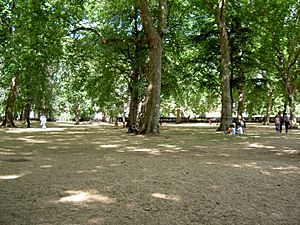
Kensington has three main roads that run east to west. The most important is the A4 Cromwell Road. This road connects Kensington to Central London in the east and to Heathrow Airport in the west. North of this road is Kensington Road (which includes Kensington High Street). To the south is Fulham Road, connecting South Kensington with Fulham. There aren't as many main roads running north to south.
Kensington has good public transport. Most of the area is served by three tube stations in Travelcard Zone 1: High Street Kensington, Gloucester Road, and South Kensington. All three are on the Circle line, which connects them to London's main railway stations. The District line also serves these stations. The Piccadilly line connects South Kensington and Gloucester Road to the West End in about 10 minutes. It also goes to Heathrow Airport in about 20–40 minutes.
Additionally, Kensington (Olympia) station in Travelcard Zone 2 serves the western part of Kensington. It has District line trains to Earl's Court and High Street Kensington.
Many local bus services connect Kensington to nearby areas. Key bus stops are at Kensington High Street and South Kensington station.
In 2020, a temporary cycle lane was put on Kensington High Street. It was funded by the government, but it caused a lot of discussion and was removed later that year.
Sports in Kensington
Kensington has one football team called Kensington Borough F.C.. They play in the Combined Counties Football League.
Famous People from Kensington
- Ivan Berlyn (1867–1934), film and stage actor
- Antonia Bird (1951–2013), film director
- Howard Blake (born 1938), composer, conductor, and pianist
- Frank Boys (1918–2003), cricketer
- Les Champelovier (1933–2023), amateur footballer
- Frank Cadogan Cowper (1877–1958), artist
- Daniel Day-Lewis (born 1957), retired Academy Award-winning actor
- Dennis Wise (born 1966), footballer
- Dido (born 1971), singer and songwriter
- Carmen Ejogo (born 1973), actress
- Evangeline Florence (1867–1928), soprano singer
- Justine Frischmann (born 1969), musician
- Percival Gale (1865–1940), cricketer
- Tom Holland (born 1996), actor
- William Leach (1883–1969), cricketer
- Rotha Lintorn-Orman (1895–1935), activist
- Montague MacLean (1870–1951), cricketer
- Freddie Mercury (1946–1991), frontman of the British rock band Queen
- Jimmy Page (born 1944), guitarist of the British rock band Led Zeppelin
- Una-Mary Parker (1930–2019), journalist and novelist
- Reginald Popham (1892–1975), cricketer and footballer
- Sir John Richard Robinson, journalist and editor
- Christopher Stanger-Leathes (1881–1966), rugby player
- Jason Vale (born 1969), lifestyle coach
- Frank Ward (1888–1952), cricketer
- Frank Westerton (1866–1923), stage and silent-film actor
See also
 In Spanish: Kensington para niños
In Spanish: Kensington para niños


